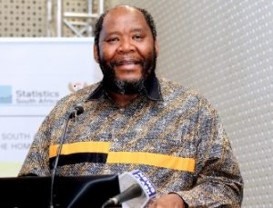

Stats SA to host the very 1st UN World Data Forum
South Africa’s Statistician-General and Head of Statistics South Africa and host of the very first United Nations World Data Forum
What do you expect from the first-ever United Nations World Data Forum? What outcomes would you like to see?
Statistics is a conduit of trust. It is a currency that holds a global promise for Transparency, Results, Accountability, Sustainability and Transformation (TRAST). It therefore creates the possibility and can facilitate global peace, progress and prosperity. It is for this reason that post-World War II, when the paragon of world peace, the United Nations, was established, statistics was central to it. From the very first-ever United Nations World Data Forum that will be held in Cape Town from 15-18 January 2017, I have two messages. First I expect that society in its entirety should understand the value and beauty of statistics, and that without society as collective respondents and purveyors and actors on data, without statistics and measurement, without high-quality statistical evidence, without appropriate indicators to communicate the evidence, without informed issue identification and informed policy action for results and remedy, and without the statisticians themselves, the world does not have an information system for any form of development, let alone sustainable development. The second message is especially crucial for first and foremost statisticians themselves, so that they realize their historical call. To be of service to global peace, progress and prosperity, statisticians must transform. The only way statistics can be useful is by engaging actively with the purveyors and politics of policy making and makers, academia, geoscience and locational technology, NGOs, technology, finance, media and citizenry.
As a statistician, what do you see as the main challenges and opportunities we have for how to use data in the service of sustainable development?One major challenge is to realize this vision of “you are because I am and we are,” that is the global Ubuntu; each one counts and therefore it counts to be counted. In many poor countries registration of the beginning, living and demise of life is woefully inadequate. Censuses of the population and population models are poor substitutes for a properly functioning civil registration and vital statistics (CRVS) system in countries. In Africa, from 2010 we initiated a vibrant CRVS movement, although it waned and now it is in dire need of a life-saving jab. It however still remains a pioneering act. Another challenge is to understand that without geographic or spatial attributes, statistical tables count for very little. At an analytical level, geographically weighted regression has demonstrated the instrumentality of spatio-temporal determinants in policy design and implementation. And this calls for the application of detailed geography for a differentiated approach to influence appropriate policy outcomes. For this to happen, disaggregation of phenomena into its atomic attributes is not only desirable but it is mandatory. In human populations this disaggregation would be by age, sex, disability, employment status, school attendance, education level, income and all this by space across time in order to leave no one behind.All these challenges require capacity and resources – to improve current methods and to find ways to incorporate new data sources. It is all an opportunity as well – because of the framework created by the Millennium Development Goals, we made a lot of progress on statistics at the national level around the world, and now we will make even more progress, in ways we can’t even imagine.
Editor’s note: This is a shortened version of the original interview, excerpts of which have been propagated in national newspapers in South Africa. Click here to Read More
Stats SA to host the very 1st UN World Data Forum

